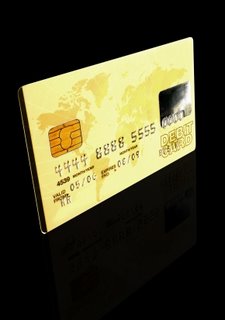Archive for the ‘credit cards’ Category
Friday, January 30th, 2009
 Credit cards and debit cards are handy tools when you want to assure yourself of a room at your vacation destination, a best price on an airline ticket, or a car waiting for you when your flight touches down. Credit cards and debit cards are handy tools when you want to assure yourself of a room at your vacation destination, a best price on an airline ticket, or a car waiting for you when your flight touches down.
But before you whip out just any credit or debit card, be aware of what will happen next, and how it can affect both your cash flow and your credit scores.
When you book a room and give your credit or debit card number, most hotels will immediately check to see that you do have the credit or the funds. That’s reasonable, isn’t it? The next step may also be reasonable, but can be detrimental to you.
Because they want to be assured that they’ll be paid if they hold your room and you turn out to be a “no show,” they then place a “hold” on an amount equal to the expected charges for your stay. If you call and cancel within their specified time frame, they’ll release the money, but meanwhile, it’s as if you’ve already spent it.
Gas stations and rental car agencies use the same practice, and some car rental agencies check your actual credit report each time you rent a car – placing numerous credit score-damaging inquiries in your file.
So be careful. It makes sense to book a room early if you’re traveling to a popular destination, or if you have an opportunity to get a reduced rate on your room or your airline tickets, but choose a little-used credit card – one that you don’t use for day to day purchases. If possible, choose a card with a large credit line, so that your hotel reservation doesn’t use up more than 30% of your available credit.
If you use your debit card, get the exact amount that they’ll hold and write it into your check register as an amount already spent. Otherwise, you could be faced with returned checks, overdraft fees, and a bad stain on your credit report.
Reservation clerks will tell you not to worry – your card won’t be charged unless you fail to show up. Then you’ll have the option to use the card or pay by another means once you get there. And that’s true.
But in the eyes of your banking institution, your credit card issuers, and the credit bureaus who determine your FICO scores, a “hold” is as good as a charge. It reduces your available checking account balance, or reduces your available credit while raising the percentage of credit usage to credit available.
Posted in credit cards | Comments Off
Monday, January 19th, 2009

Credit card issuers will have to adhere to some new rules by July 2010. That’s a step in the right direction, but could be too late for many consumers. In addition, the new regulations don’t address some of the issues that have angered credit card holders.
One of those issues is customer service. Cardholders are receiving notices in their statements, or in separate pieces of mail that are often mistaken for junk mail. These notices are hard to understand, so they’re calling customer service for help.
But… often the company reps can’t answer their questions. They don’t understand the notices either. Some will give an answer, and then if the consumer calls back, someone else will give a different answer. This is no help for the cardholders.
Consumer advocates are saying “Train your people!” This is especially important when those consumers are getting letters telling them they’re going to be paying more to pay off their debts.
Even more anger is generated by broken promises. Cardholders who have complied with the initial agreement they had with the card issuers are now getting notices that the agreement has changed. Their interest rates have been raised, they’re getting new fees, and their credit limits have been lowered.
This might be understandable if the consumer had been late with payments or had gone over limit. But these notices are also going to people who have held up their end of the bargain. Card issuers are changing the terms of the agreements with no provocation, after consumers are already in debt to them.
When interest rates escalate from 11% up to 19% – or even higher – more consumers have trouble making the monthly payment and of course are taking longer to pay down their debt.
Other consumers report that they had responded to offers urging them to transfer balances from higher rate cards, and would receive a 4.9% interest rate for the life of the transferred balance. They’ve been paying more than the minimum monthly payment, on time, every month. Now, while their interest rate has not been raised, they’re being slapped with a monthly service fee. Technically, it isn’t an increase in interest. But in practice, it is.
Credit card issuers say they are taking these steps to manage their own risk, but they knew when they went into the business of loaning money with no collateral that there would be risk involved. That doesn’t mean they should be able to change the rules after the game has begun.
Interestingly, these risk management moves may backfire. In addition to keeping people in debt longer, these credit card issuers are forcing some to default. Thus their worries about collecting the money owed are becoming reality.
According to the Federal Reserves’ most recent report on consumer credit, Americans have $976 billion in credit card debt, and the card issuers have been making billions in interest, annual fees, late fees, and over limit fees for years.
That makes it pretty difficult for credit card issuers to gain any sympathy from consumers struggling to pay off their credit cards.
Posted in credit cards | Comments Off
Monday, October 20th, 2008
 There is currently 1 trillion in spending using debit cards. The question is should you use a credit card or a debit card for your purchases? This really depends on your current circumstances. The consumer union currently states that if a consumer uses there debit card 20 times or more a year they will spend $223 in bounced check fees. The individual that does not use debit cards pays an average of $40 per year. There are advantages and disadvantages to both types of cards. There is currently 1 trillion in spending using debit cards. The question is should you use a credit card or a debit card for your purchases? This really depends on your current circumstances. The consumer union currently states that if a consumer uses there debit card 20 times or more a year they will spend $223 in bounced check fees. The individual that does not use debit cards pays an average of $40 per year. There are advantages and disadvantages to both types of cards.
If you are a person that holds a balance on your credit card it might make sense to use your debit card. If you are the type of person that has a credit card with no annual fees, and you don’t hold balance on your credit card then credit cards are the way to go. The reason for this is you can keep your money in a interest bearing account as opposed to using your debit card which takes the mosey directly from your interest bearing checking.
There are a lot more advantages to using a credit card especially if you pay off your balance every month. There are credit cards that will reward you with points for every dollar you spend. Your debit card does not provide this type of reward what so ever. Using your debit card like cash can get out of control and cause bounced checks and costly insufficient fund fees. Also debit cards do not report to the credit bureaus as good credit like credit cards.
Just remember that using a credit card should be used responsibly and is not for everyone. If you can’t control impulsive buys then a debit card might be ideal for you.
*some information was taken from Bankrate.com
Posted in credit cards | Comments Off
Wednesday, October 15th, 2008
 There are all types of credit card offers out there such as reward credit credits, secured credit cards, student credit cards, business credit cards and sub prime credit cards. Obviously depending on your credit report and credit scores will ultimately determine the rate and terms of your card. Credit cards are necessary during this day and age for many reasons. The first reason is credit building and also for emergencies purposes as well. Some card holders will use one credit card to pay all there bills on to get the air line miles or points towards other purchases. There are all types of credit card offers out there such as reward credit credits, secured credit cards, student credit cards, business credit cards and sub prime credit cards. Obviously depending on your credit report and credit scores will ultimately determine the rate and terms of your card. Credit cards are necessary during this day and age for many reasons. The first reason is credit building and also for emergencies purposes as well. Some card holders will use one credit card to pay all there bills on to get the air line miles or points towards other purchases.
Reward credit cards are a hot ticket currently. You can get points for every dollar spent towards other types of perks. Every credit card company is offering different rewards for charging on there cards. So depending on the credit card company, your rewards will vary, but at times it can be worth it as long as you pay of the charged balance every month. This type of credit card might be ideal for a individual that spends a lot of money on expense or flying regularly.
Business credit cards are a great way to build up your business credit. Some of the business credit cards reward your business for spending as well. Maybe you fly a lot as a result of your business; there are cards that pay you airline miles for every dollar spent. Some business credit cards will give discounts up to 25% on business expenses. Every business owner should have a business credit card.
Secured credit cards are ideal for individuals that are new to credit or are in the rebuilding stage of credit. Secured credit cards are the quickest way to establish credit for newbie’s to the credit arena. A secured credit card usually requires a deposit from you in the amount of $250 to $300 to secure the credit card. Once you have secured this card with your funds in about 30 to 60 days this credit card will report to all 3 credit bureaus. This starts the credit building stage promptly. With a good 12 month payment history you will start getting credit card offers in the mail. Once this starts you are well on your way to building a healthy credit report.
Student credit cards are ideal for anyone that is new to the credit building process while in college. This card is an un-secured credit card that does not require large deposits of your own money. Usually this card will extend low credit limit that will gradually climb with good payment history.
Remember to pay your credit cards on time and to keep your balance owed under 30% of credit limit.
CreditScoreQuick.com
Posted in credit cards | Comments Off
Wednesday, July 30th, 2008
The venture to build a good credit score is sometimes aggravating and exhausting. If you have never had credit or let all your credit go to collection, the first step on building your credit scores is building or rebuilding your credit report. Anyone that understands this process will tell you your first step is to get some secured credit cards. There are some matters you need to know that will drop your credit score though. Here is what you need to know.
Secured Credit Cards
This type of credit card is a great way to establish credit regardless of your situation. Reason behind the success of this card is because it reports to the credit bureaus as good revolving credit. This card does require a deposit of your own money into the banks account, typically around $300. The good news is with a little payment history you are on your way to save because you have higher credit scores now. It’s a small investment to save lots of money down the road.
Too much credit too quick
If you apply for too many credit cards to quick, your credit score will drop. The credit scoring models look at this as high risk. I would just apply for two credit cards only, that is all your really need.
Credit History
When your credit scores are calculated the length of credit history is a factor as well. If you just applied for credit cards your credit scores could drop, but they will eventually go up. There are all kinds of factors in the credit scoring process, and if its new credit it will take some time to see improvement in your credit scores. But remember this is the quickest way to increase your score though.
CreditScoreQuick.com
Posted in credit cards, fico score, free credit score reports | Comments Off
Thursday, July 24th, 2008
You probably never thought that transferring credit card balances from one credit card to another credit card would affect your credit score. It may sound like a good idea to transfer high credit card balances to lower interest rate credit cards banks. In some cases this is a good idea, but it really depends on some circumstances. When your credit score is determined, one of the factors in the credit scoring process is the amount of debt owed. This accounts for 30% of your credit score. I am going to discuss two scenarios, one that will not affect your credit score and one scenario that will.
Scenario One
Let’s assume you have a credit card with a balance of $6,000 on it. The interest rate on this card is killing you and you have found a better deal to pay off the card quicker. The new card has approved you for $7500 credit limit and 0% interest on balance transfers for 18 months. This sounds like a good idea. So you transfer the balance to the new card for the low interest rate.
Here is the problem:
When you owe more than 30% of the allowed credit limit on a credit card, this will drop your credit score. With this scenario you have almost used up all the credit they gave you. This is not wise at all. The balance you owe compared to the approved credit limit it way too high. You have 80% of the card limit already used up. This will affect your credit core
Scenario Two
Let’s assume you have a credit card with a balance of $6000 on it. Plus you just got approved for a credit card with a credit limit of $25,000. They are offering the same deal on transfers as above, but they gave you a higher credit limit. This is the ideal situation and will not affect your credit score. The reason is the balance owed compared to credit limit is around 24%. This is considered low risk to most credit scoring risk models.
This principal can be applied to all credit card balances. You should not have your credit card balances charged up more than 30% of the allowed credit limit.
CreditScoreQuick.com
Posted in credit cards, free credit score reports | Comments Off
Saturday, July 19th, 2008
 As new graduates embark into the world of independent living, most are ill prepared to deal with their own finances. It’s a shame that “Money Handling” isn’t a required course in all High Schools and Colleges, because starting off on the right foot can lead to a much more pleasant life than starting off wrong. As new graduates embark into the world of independent living, most are ill prepared to deal with their own finances. It’s a shame that “Money Handling” isn’t a required course in all High Schools and Colleges, because starting off on the right foot can lead to a much more pleasant life than starting off wrong.
When you have a good credit score, lenders see you as a low-risk person. As a result, they’ll offer you lower interest rates, lower minimum payments, less paperwork, and more borrowing options. Poor scores have the opposite effect.
In fact, with a bad credit score you could be denied jobs, car loans, mortgage loans, insurance, or even rental housing. If you can get insurance, with a poor credit score you’re apt to pay rates that run more than twice as high as they would be if your score was good. And if you can get loans, you’ll pay 4 or 5 times as much interest as you would with a good score.
Creating a good financial reputation (credit score) isn’t difficult, but it does require a little discipline. And it does take time, so start early. The longer your record of responsible money management, the easier your life will be.
This means saying “no” to most of the credit card offers that come your way, and working hard never to use over 50% of the credit available to you. It also means paying each of those bills by the due date, and paying a bit more than the minimum payment. Strive to keep your non-mortgage debt down to 15% of your income, even when it means delaying the purchase of a new toy or a classy addition to your wardrobe.
One good way to make sure you pay your bills on time every time is to create a chart that shows each bill and the date it’s due. One caution: don’t assume that the due dates will be the same each month. Read each bill when it comes in and adjust the payment date accordingly.
Budget your payments and adjust your discretionary spending accordingly – so that you’re never in a position to make a late payment. Even if that means skipping Saturday night out.
Next, begin to build your net worth. Check in to automatic savings, deducted from your paycheck before you even see it. Small amounts add up, and they will raise your credit score. In fact, having both a checking and a savings account will earn you a score 4 times higher in that category than having a checking account alone.
If automatic savings aren’t available, discipline yourself to make that deposit from each and every check.
Lastly, be sure to check your credit score often – so if there’s a mistake you can get it corrected quickly!
Posted in credit cards, free credit score reports | 1 Comment »
Sunday, July 13th, 2008
If you are new to the United States because you just arrived from another country, welcome. In this article I wanted to discuss how you can establish credit as a new citizen of the United States. People from all over the world come to the US to pursue the American dream. Some come here to study and then go back to their country. What every your situation is, as long as you have a social security number I can help you establish credit scores. When arriving to America the first thing you need to do is get your credit established. Here are tips to get this going.
Rental & Utilities
I would hope by now you have a job, so you can show someone that you are paying some sort of rent. Rental is part of the credit building process. Credit Card companies and banks want to see that you are paying rent to someone. This also allows you to get your utilities in your name. Paying your light bill, electric bill, and phone bills are part of the credit building process. Make sure you pay all these bills on-time.
Work History
Make sure you have work history. Obviously if you are applying for some type of credit the creditor wants to see that you are working to pay back any debt owed.
Open a checking account
Having a checking account is a standard question on loan applications. This shows the creditor you might be responsible with you money.
Open a savings account
Having a savings account shows that you have the ability to save incase a emergency should arrive. Most creditors like to see this in place.
Apply for a secured credit card
There is no quicker way to establish credit scores than with a secured credit card. These types of cards require a deposit by you in designated account by the card issuer. Typically the balanced required by you is anywhere between $250 and $350. Once you have secured a credit card, this begins the credit building process on your credit report. Typically I recommend 2 cards to get the credit score building process underway.
Student Credit Cards
If you are here studying you should apply for a student credit card also. This card is much easier to get if you are in college. This card does not require a deposit, but is considered a sub-prime card with higher interest rates. This card is a great way to get your credit established as well.
After six months of paying on a couple credit cards with no late payments you will be scored on your credit report. You might also consider getting a small car loan as well. The credit scoring process likes to see a mix of credit reporting on your credit report. This process mentioned will get your credit underway fairly quickly. Remember to be responsible with your new credit and never be late on anything.
About the Author: Mike Clover is the owner of http://www.creditscorequick.com/. CreditScoreQuick.com is the one of the most unique on-line resources for free credit score report, fico score, free credit check, identity theft protection, secured credit cards, student credit cards , credit cards, mortgage loans, auto loans, insurance, debt consolidation ,and a BlOG with a wealth of personal credit information. The information within this website is written by professionals that know about credit, and what determines ones credit worthiness
Posted in credit, credit cards | Comments Off
Sunday, June 29th, 2008
Q:
Hello I have been trying to establish credit after a divorce my credit has been ruined. I have tried applying for different credit cards. I have been denied for all of them due to my credit score report. What do you guys recommend I do? I need a couple credit cards to get some credit going. I currently don’t have any credit at all. Most of my good credit went south during a nasty divorce.
Lucy

A:
Hi Lucy,
We are sorry to hear about the divorce. This type of history is all too common after divorces. If you have applied for un-secured credit cards and been denied then you must start out with secured credit cards. Secured credit cards are where you give the bank usually between $200 and $300 in a bank of there choice to secure the credit card. Secured credit cards are the quickest way to establish credit. After good history you will start getting all kinds of credit card offers in the mail.
CreditScoreQuick.com
Posted in credit cards | Comments Off
Saturday, June 21st, 2008
 Q: Q:
Hi Mike,
I have closed 2 credit cards that I have not used in years. I have 3 other credit cards that I use with lower interest rates and fees. That is the reason I closed them. I was reading through some of your articles and noticed you recommended not closing out credit cards. How much do you think this will affect my credit score? I currently have excellent credit and hope I did not mess up my credit score.
Marcus
A:
Hi Marcus,
Yes I am against closing out good credit reporting on your credit report. This does affect your credit scores, because you just got rid of good credit. Typically you will see around a 10 to 15 point drop in your credit scores. Since you have other credit cards this should be temporary. Just make sure you keep your credit card balances below 30% of credit limit. My FICO recommends a mix of credit as well. For instance credit cards, car loans, installment loans, etc…….Good luck to you.
Mike Clover
About the Author: Mike Clover is the owner of http://www.creditscorequick.com/. CreditScoreQuick.com is the one of the most unique on-line resources for free credit score report, fico score, free credit check, identity theft protection, secured credit cards, student credit cards , credit cards, mortgage loans, auto loans, insurance, debt consolidation ,and a BlOG with a wealth of personal credit information. The information within this website is written by professionals that know about credit, and what determines ones credit worthiness.
Posted in bad credit credit cards, credit cards | Comments Off
Disclaimer: This information has been compiled and provided by CreditScoreQuick.com as an informational service to the public. While our goal is to provide information that will help consumers to manage their credit and debt, this information should not be considered legal advice. Such advice must be specific to the various circumstances of each person's situation, and the general information provided on these pages should not be used as a substitute for the advice of competent legal counsel.

|
 Credit cards and debit cards are handy tools when you want to assure yourself of a room at your vacation destination, a best price on an airline ticket, or a car waiting for you when your flight touches down.
Credit cards and debit cards are handy tools when you want to assure yourself of a room at your vacation destination, a best price on an airline ticket, or a car waiting for you when your flight touches down.







